In My Sporting Hero, a new podcast series from Nutmeg, footballers talk about the athletes who inspire them. Sometimes those sportsmen and women are also footballers. Sometimes not. You can listen to the audio on this post, on the podcast app of your choice (just search for ‘My Sporting Hero’) or enjoy the written version below.
This week’s guest is Gerry Britton. Gerry signed for his boyhood heroes Celtic, but it is for two spells as a prolific striker with Partick Thistle that he is best remembered. He later returned to his beloved Firhill in various guises: co-manager, academy director and then chief executive. Gerry is now chief operating officer of the amazing charity Street Soccer Scotland.
Gerry’s sporting hero is Kenny Dalglish, Celtic’s ’70s superstar who would go on to become a Liverpool legend as player and manager.
Kenny was everything that every young player wanted to be. Not only was he a natural talent, but he had the look, the long hair that you maybe weren’t allowed — he was just cool. And he was from our neck of the woods. My first memories of Kenny were of my dad taking me to watch Celtic aged three or four. The Lisbon Lions were dropping off and the Quality Street Kids were coming through — Kenny, Danny McGrain, David Hay and the rest. But Kenny was the king, the focal point of the team. He quickly became captain when Billy McNeill retired. He had every attribute you looked for in a sporting hero.
The quarry was a big spare bit of ground between Bishopbriggs — where I grew up — and Milton, where Kenny was from. They had firework displays there. We played there — we played anywhere in those days. We knew Kenny’s story, his background and we knew that he came from close to where we were. There was no friendship or relationship there, but everybody knew of him from an early age — this promising young player who was hopefully going to come in and take the place of the Lions. Having somebody like that on your doorstep just made it all the more special.
He was different in so many ways. Maybe he didn’t quite have the stature — he was physically stocky. He stood out from the norm. And that was before he got the ball. But when you actually watched him in action, he just made the game look so simple. Even then, you could see that there was something special about him that meant we were probably not going to be able to enjoy him for a long time. We knew we had to savour it. In those formative years, when he was coming through, he just played with such freedom and finesse that it was like nothing you’d seen before. I don’t think I’ve seen anything like it since, either.
He could do everything, Kenny. He could play on the wing, play as a nine, a 10 — when a 10 wasn’t really a thing. I remember hearing that Stein used to play him in different positions. I had the opportunity to ask Kenny about it once at an SFA coaching course. He said Stein would play him in midfield and at the back, but would always say ‘you’re going to be a striker’. I think you could see that grounding, that understanding he had of different positions. He wasn’t lightning-fast, but he was 10 yards quicker in his head, so he always looked as if he was ahead of the game. He was. He had an understanding and reading of the various positions — and this at a time when forwards were predominantly sniffers and would just hang about the six-yard box waiting for a chance to be created. Kenny could create chances and he could score.
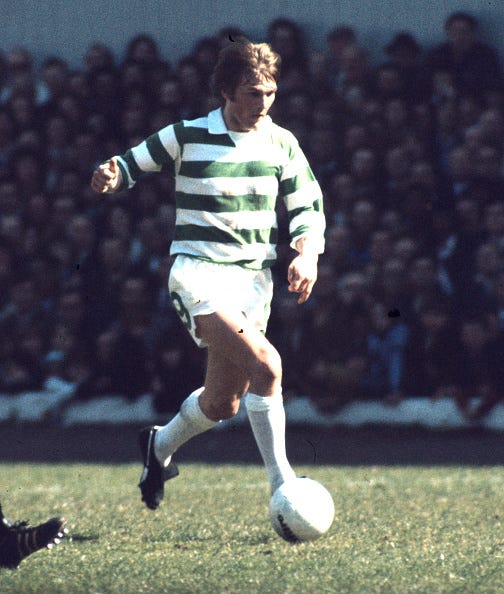
I suppose that’s just the genius of Stein — he’d developed the Lisbon Lions and then, just as Sir Alex Ferguson was able to do, was able to reinvent a new team and bring through this fantastic crop of players in the aftermath of Lisbon. I think Kenny put a lot of that down to the rest of the coaching staff, too. Sean Fallon and the other coaches helped develop his mindset as a player, not just his ability. If you’re coming through with that kind of quality around you, then it’s going to take you on to a different level. So you can say it’s coincidence, or you can say that it’s down to the fact that every day even the reserve training must have been phenomenal. Then, as the Lions started to drop out, the Quality Street Kids were getting more and more opportunities in the first team, and it was just a seamless process. It was one of the reasons Celtic were able to keep the run going and get nine league titles in a row during the seventies.
I’ve only been in his company a couple of times and he’s not what you’d call an effervescent personality. He’s very dry, a really, really funny guy. But when you see him on the pitch, he’s a study of seriousness. Similar to all the great players, you can see their minds are just whirring during the game. Focused. Then that release when he scores a goal — that explosion, and just the way his arms are out, always the same celebration, with that big cheesy grin just to wrap it all up.
I was really fortunate. I would go week in, week out from when I was three or four with my dad, especially the European nights. So many tussles with Rangers and Dundee United, and Aberdeen starting to come to the fore. I also remember the various partnerships that Kenny struck up during that time, guys that I have no doubt were taken to another level from playing with Kenny — Ronnie Glavin, Joe Craig, Johannes Edvaldsson. Good players who became greater because they had the benefit of playing with Kenny. I always remember him and Paul Wilson combining superbly on so many occasions. It was just a great time to be a Celtic fan. We were well aware that this wasn’t going to last forever, but we had to try to make the most of it.
When we lost Kenny, it was like a death in the family, because he was our hope
In the summer of 1977 there was so much going on. I remember it as one of the hottest summers on record. It was the Jubilee, Virginia Wade won Wimbledon, and to top it all off we lost Kenny. It was like a death in the family, because he was our hope, the man that was going to bring a European Cup back to Parkhead. Everybody had faith in him as the skipper and leading the club forward. So it was devastating not for just me and my cohort of friends and family, but for the whole Celtic support. There was a dark cloud over the club that lasted for a few years.
To be fair to Kenny, with the benefit of hindsight, it was 100 per cent the right decision for him to move to Liverpool. It developed him as a player and as a person. For somebody that had never been out of Glasgow, he made a choice to up sticks and go into one of the best teams in Europe, replacing Keegan, who was an icon in that part of the world. He didn’t just replace him, he blew him away. I think it was not a bad start being able to score the winning goal in the European Cup final when you’ve only been there a matter of months! That just showed the class of the guy.
From a Celtic perspective, we were of the view that with Kenny anything was possible. Celtic were winning league titles, Kenny was maturing, the rest of the team were maturing, we were progressing in Europe. Liverpool and then Forest and Aston Villa went on to win the European Cup multiple times in the next 10 years. There’s nothing to say that, if Kenny had stayed, Celtic wouldn’t have been one of those teams to take the European Cup again.
My mum found this photo (below). I must have been about 10 or 11, so this would have been about 1980. It’s outside Anfield, and that’s me with a scarf that my granny knitted. It’s got McDermott, Hansen, Souness and Dalglish crocheted into it. The boys were saying the other day, ‘okay, Hansen, Souness, Dalglish – so why did you have McDermott?’ And I replied, ‘my granny probably thought he was Scottish!’ There was a huge number of Celtic fans at the time who became Liverpool fans.
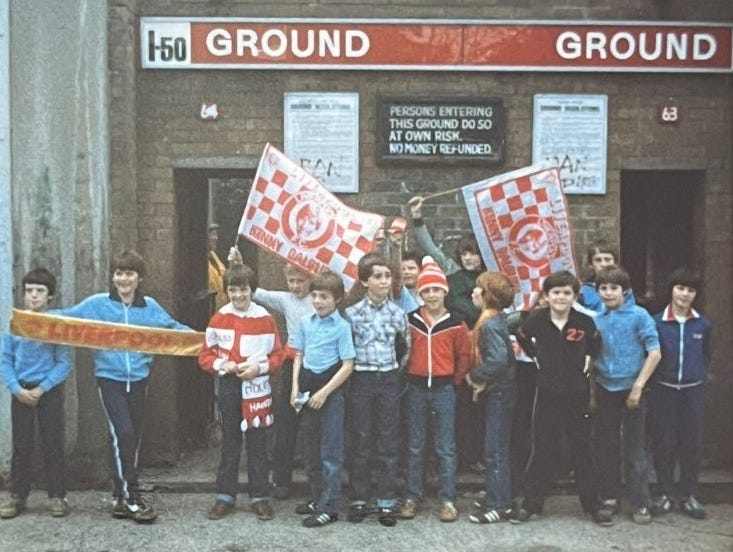
I’m really fortunate that I was part of a coaching convention that Kenny and Henrik Larsson were both invited to by the SFA about five years ago. Kenny did a Q&A with the coaching staff and it was fantastic. What I love about him is that there’s been no change in his accent. He’s been living down south the majority of his life, but it still sounds as if he’s from the Milton. That resonates with the Glaswegian in me. To be able to pick his brains on an intimate level was brilliant.
The other occasion I remember meeting him was when I was a young player at Celtic. I was on the ground staff when Kenny came up to play in Davie Provan’s testimonial in 1987. There we were in the boot room as usual, getting things ready for training. We didn’t know that Kenny was coming up. Then he walked into the boot room, and we all just hit the deck! We just couldn’t believe that Kenny Dalglish was actually standing next to us. It was just, “Right wee man, give us a pair of boots”. No airs and graces. We were in total awe and just followed him around for the rest of the day.



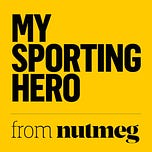
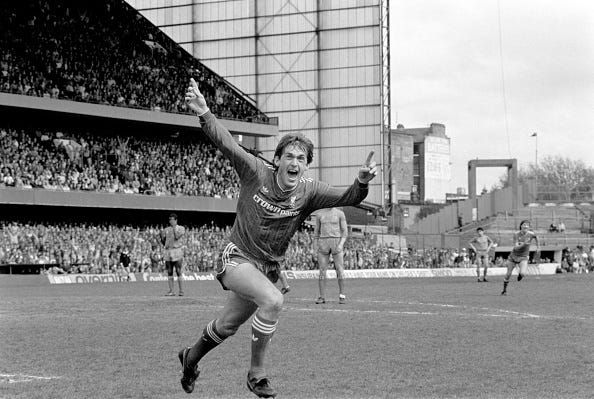
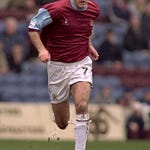
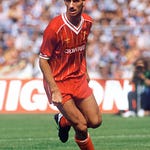






Share this post